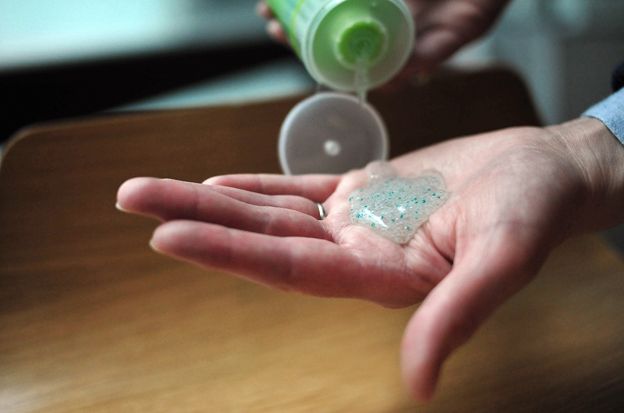Who, What, Why: Why do people want to ban 'microbeads'?
- Published

Tiny particles called "microbeads" are in many beauty and cleaning products. Why do people want to ban them?
Pick up some shower gel in a chemist and it may well have little bits in it. "Microbeads" is the technical term. They are tiny plastic pieces designed to remove dry cells from the surface of the skin.
It's not just shower gel. Face washes, toothpaste, and cleaning products have them for their abrasive qualities. But are they damaging the water supply?
The crystals are too small to be filtered out at water treatment plants and environmentalists claim they end up in lakes and rivers. The fear is that plastic soaks up toxins, is eaten by fish and other creatures, building up in the food chain and is eventually consumed by humans. Now five US states are considering banning them, Time has reported. Some of the biggest cosmetics firms, such as Johnson & Johnson, are vowing to end their use by 2017.
Microbeads have been around for a while but their role has been little discussed. Kate Shapland, beauty columnist at Telegraph Magazine, says the principle behind them is that they make the skin smoother by removing dead layers. She advises people to make sure the shower gel is rich in beads. There's no point having five beads per dollop and trying to push it all the way around your leg, she says.
Guardian beauty critic Sali Hughes says they can look pretty. But they don't work. In theory they are supposed to be exfoliating - scrubbing away dead skin - or nourishing to the skin when the bead bursts. "I think they're useless. In practice it doesn't scrub skin off as it's too soft. It either falls off the skin or needs too much pressure to burst." If they damage the water supply then that's another reason to avoid, she says.
Industry body the Cosmetic, Toiletry and Perfumery Association says it's too early to blame microbeads. The presence of "micro size plastic" in the water supply is caused by many factors, such as synthetic fabric being broken down in washing machines, says Dr Chris Flowers, CTPA director general. However, it has alerted members to the problem and many companies are removing plastic microbeads from their products, he says.
For those looking for a new exfoliating routine, there is another way. Use a granulated body scrub with sugar or salt, recommends Hughes. And for the face, she adds, nothing beats a hot flannel.
Follow @BBCNewsMagazine on Twitter and on Facebook